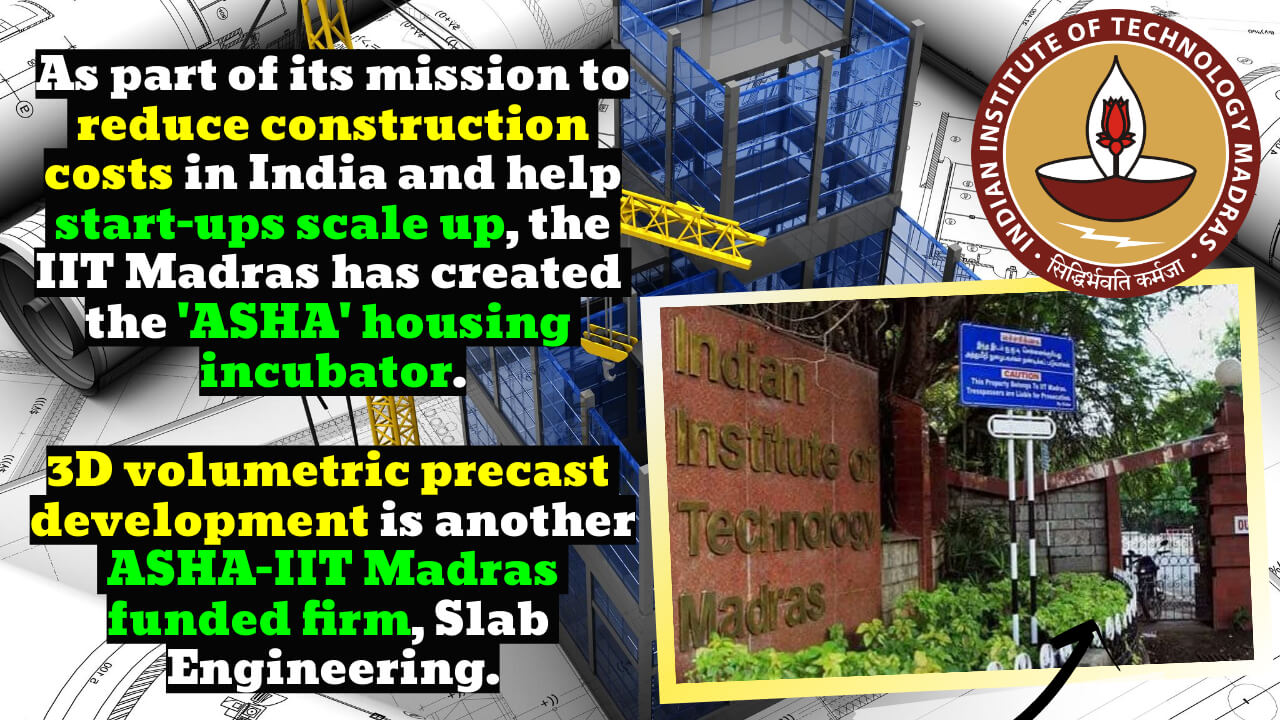There is a project called ASHA that the Ministry of Housing and Urban Affairs works on. The incubator has already helped start-ups like Tvasta, which built India’s first 3D-printed house. They have been set up at four IITs and the CSIR-NEIST in Jorhat.
Key Highlight:
- As part of its mission to reduce construction costs in India and help start-ups scale up, the Indian Institute of Technology (IIT) Madras has established the ‘ASHA’ housing incubator.
- The Ministry of Housing and Urban Affairs ‘Accelerator Affordable Sustainable Housing Accelerators’ provides incubation and acceleration support to possible future innovations that are not yet market-ready (pre-prototype applications) (post-prototype applicants).
- Officials said the incubator has already helped Tvasta build India’s first 3D-printed house and the first 3D-printed doffing unit used by COVID-19 frontline healthcare workers to remove PPEs safely.
- The ‘ASHA’ incubator’s main goals are to identify innovations, provide technical help to new concepts, business support and mentoring, and infrastructural support.
- IIT Madras will focus on business success.
- Slab Engineering is another ASHA-IIT Madras-backed firm involved in 3D volumetric precast development.
‘ASHA’ is a housing incubator at the Indian Institute of Technology (IIT) in Madras, India. Its goal is to find and support new and innovative housing technologies, lower the cost of construction in India, and help start-ups grow their ideas.
The ‘Accelerator Affordable Sustainable Housing Accelerators’ is a project of the Ministry of Housing and Urban Affairs. It gives incubation and acceleration support to technologies that aren’t yet ready for the market (pre-prototype applicants) or technologies that are ready for the market (post-prototype applicants).
There have already been a few start-ups that have used the incubator’s help. These include Tvasta, which built India’s first 3D-printed house and the first 3D-printed doffing unit used by COVID-19 frontline healthcare workers to remove PPEs safely.
The main goals of the “ASHA” incubator are to find new technologies, provide technical support for new ideas, help businesses and mentor new ideas about how to make money, and help with infrastructure.
“The most important thing to look at would be how the technologies are used and how many housing units are built through the technologies that ASHA supports.” If IIT Madras wants to be good at business, that’s what they’ll work on. Meher Prasad, a professor at IIT Madras’ Department of Civil Engineering, said that success would be measured by how many homes are built with ASHA-supported technologies and how many people live in them.
Then there’s Slab Engineering, which makes 3D volumetric precasts. ASHA-IIT Madras backs this company, too. The company will work with IIT Madras to improve its designs and make sure that its products can be adopted.
ASHA-India centers have been set up at five institutions, including four IITs (Madras, Kharagpur, Bombay, and Roorkee) and a CSIR-NEIST in Jorhat. These centers will help develop design guidelines, construction manuals, and other important guidelines for using these technologies in the region. They will also help to make sure that these technologies are used properly.
Executive Director Shailesh Kr Agrawal, who works for the Ministry of Housing and Urban Affairs, says that the ASHA initiative is being run by the Ministry of Housing and Urban Affairs, part of PMAY-technology U’s department. The goal is to help entrepreneurs turn their ideas into products and services that people can use. The ASHA initiative is being run by the Ministry of Housing and Urban Affairs, part of PMAY-technology U’s department.





[…] Researchers at IIT Madras to develop new housing technology to reduce… […]